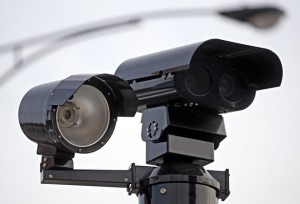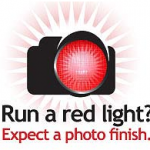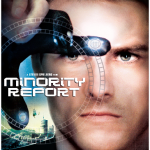
 The Chicago Tribune is at war with the City of Chicago over red light cameras. In a series of articles printed before Christmas (read at my mother’s kitchen table in suburban Chicago), the Trib reported on a study of the effects of the red light cameras on motor vehicle accidents: The number of accidents at intersections with cameras hadn’t changed. The Trib accused the City of Chicago of having installed the cameras only to raise money—slander, slander!
The Chicago Tribune is at war with the City of Chicago over red light cameras. In a series of articles printed before Christmas (read at my mother’s kitchen table in suburban Chicago), the Trib reported on a study of the effects of the red light cameras on motor vehicle accidents: The number of accidents at intersections with cameras hadn’t changed. The Trib accused the City of Chicago of having installed the cameras only to raise money—slander, slander!
 If you’ve received one of those surprise citations for a “rolling right” turn, as my wife did, then you may share the Tribune’s indignation. My wife’s was compounded by the fact that she hadn’t been driving at the time (can’t imagine who was at the wheel). A colleague of mine was auto billed courtesy of a camera that captured her coming to a full stop at a red light, but beyond the crosswalk. See the November report on Rochester’s program.
If you’ve received one of those surprise citations for a “rolling right” turn, as my wife did, then you may share the Tribune’s indignation. My wife’s was compounded by the fact that she hadn’t been driving at the time (can’t imagine who was at the wheel). A colleague of mine was auto billed courtesy of a camera that captured her coming to a full stop at a red light, but beyond the crosswalk. See the November report on Rochester’s program.
A few quick observations about the cameras before I move to my main point (which is privacy): A Chicago-based blogger has argued that the Tribune’s study did not distinguish between modest rear end collisions and those often deadly “T-bone” crashes that occur when someone speeds up to get through a changing light. Better-designed studies (see the Federal Highway Traffic Safety Administration study) have concluded that red light cameras DO reduce fatalities by trading fender benders (occurring when drivers stop quickly for a yellow or red light) for serious collisions (the accidents occurring when drivers speed up to get through an intersection).  Holman Jenkins in the Wall Street Journal agrees that the Tribune’s study is misleading and reports that Redflex Traffic Systems, the leading installer of the cameras, recommends against citations for “harmless” infractions, e.g. the rolling right and wheels in the crosswalk when no pedestrians are present. While Redflex may have gotten religion in response to driver anger (and the removal of cameras in some jurisdictions), their advice should be heeded. As long as the cameras are operated with a focus on dangerous driving, I don’t begrudge cities the fees.
Holman Jenkins in the Wall Street Journal agrees that the Tribune’s study is misleading and reports that Redflex Traffic Systems, the leading installer of the cameras, recommends against citations for “harmless” infractions, e.g. the rolling right and wheels in the crosswalk when no pedestrians are present. While Redflex may have gotten religion in response to driver anger (and the removal of cameras in some jurisdictions), their advice should be heeded. As long as the cameras are operated with a focus on dangerous driving, I don’t begrudge cities the fees.
But it is chilling to be sent a ticket with a link to a video of your car. License plate readers are gathering information about our movements all the time. The Democrat & Chronicle is waging a war of its own—the paper has been pursuing a Freedom of Information Act request for records of license plate “sightings” by Monroe County law enforcement cameras. They’ve asked for records of the plates of publicly owned vehicles—e.g. the cars driven by Monroe County’s Deputy County Executive and Rochester’s Mayor—and the records of individual reporters’ plates at their own request. How can the County Sheriff refuse a request for records of sightings of my vehicle? I know where my car has been—no confidentiality is at issue. Supreme Court Justice John Ark commented during court proceedings in December that Monroe County likely had an obligation to release individual records to the owners of vehicles. He has not issued a ruling, however.
Now let me connect the Charlie Hebdo attack. We’ve learned that the perpetrators were well known to law enforcement, both in the United States and in France. Many have asked the obvious question: Why were they not being better watched?
Which brings us full circle: How much surveillance of ourselves are we willing to accept? How much of others do we expect? As the National Security Agency will remind us, it is hard to watch only the terrorists.
 My favorite horror movie is the Tom Cruise film, Minority Report. Forget the piece of metaphysics called “pre-cognition” that is the movie’s central conceit. What gives me chills is the conventional physics, the notion that ubiquitous cameras and powerful computers can perform retinal scans on the fly, tracking our every movement. Cruise’s character can only disguise his identity by stealing another man’s eyeballs. How many years will it take before this is possible? Perhaps we should ask the NSA.
My favorite horror movie is the Tom Cruise film, Minority Report. Forget the piece of metaphysics called “pre-cognition” that is the movie’s central conceit. What gives me chills is the conventional physics, the notion that ubiquitous cameras and powerful computers can perform retinal scans on the fly, tracking our every movement. Cruise’s character can only disguise his identity by stealing another man’s eyeballs. How many years will it take before this is possible? Perhaps we should ask the NSA.